Uncategorized
Who is Jessica Tisch, the Jewish police commissioner both Mamdani and Cuomo want to keep?
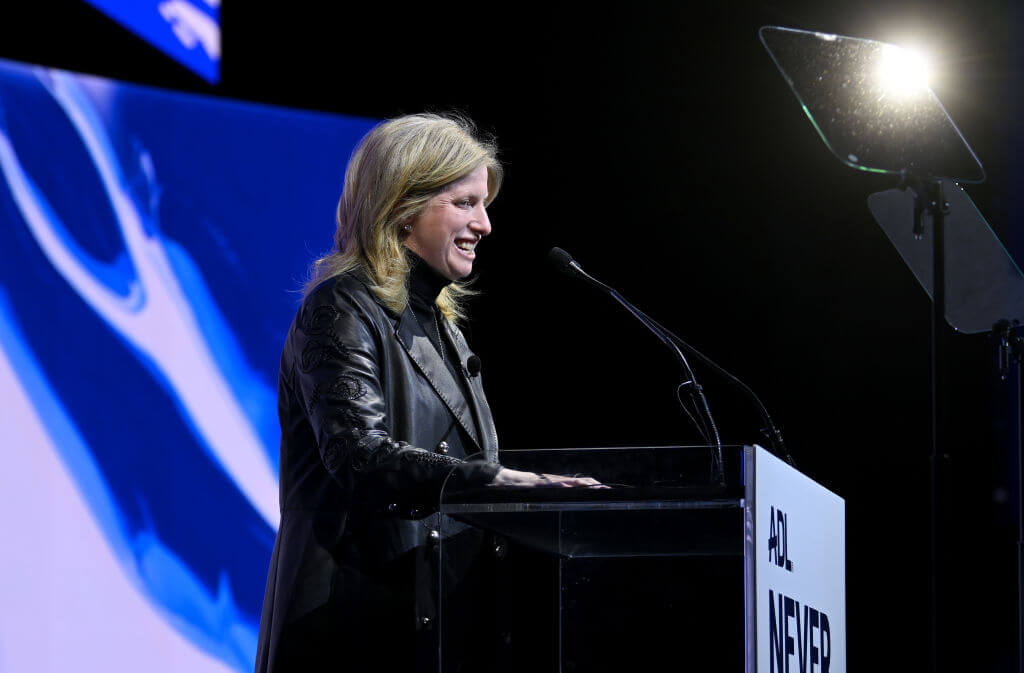
For Zohran Mamdani, the democratic socialist who would be New York City’s first Muslim mayor if elected, promising to keep Jessica Tisch as police commissioner is a key campaign gesture, given his past stance on defunding the police. For many Jewish New Yorkers, still shaken by rising antisemitism since the Oct. 7, 2023, attacks and uneasy about a shifting discourse on Israel, Tisch offers a sense of stability and reassurance.
Tisch, 44, who comes from one of the city’s prominent Jewish families, is widely respected in the Jewish community for her record on public safety since her appointment last year and for her strong support of Israel. Five of her deputies are also Jewish.
Critics brushed off Mamdani’s proclamation that he wanted her to stay — at last week’s televised debate — as a political stunt, given the Democratic nominee’s positions on Israel. He has refused to outright condemn the slogan “globalize the intifada,” has said he doesn’t recognize Israel as a Jewish state, supports pro-Palestinian activism on campus and has pledged to order the arrest of Israeli Prime Minister Benjamin Netanyahu if he visits the city.
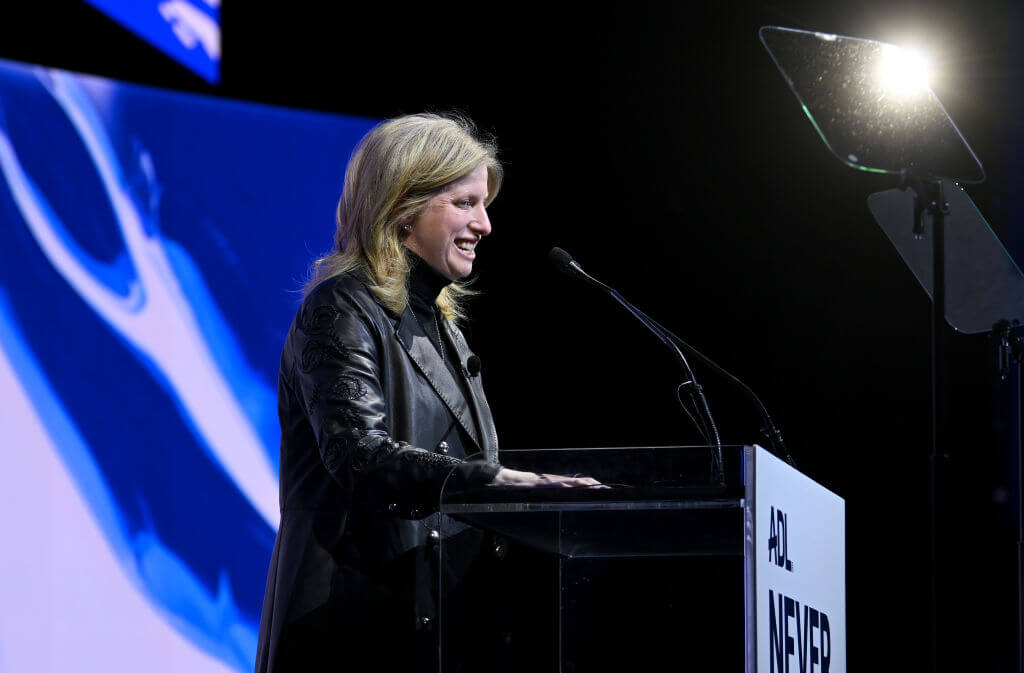
Tisch’s approach to policing is a stark contrast to Mamdani’s progressive public safety agenda. And her public statements on Israel have been unequivocal. When she was sworn in as NYPD commissioner, she wore a Star of David necklace to the ceremony. “My Jewish identity is not something that I put on and take off,” she said in a speech earlier this year at the Anti-Defamation League’s “Never is Now” conference. “It is who I am and who I will always be.”
Still, Mamdani’s pledge to keep her was seen as a reassuring signal. House Minority Leader Hakeem Jeffries, who had previously avoided taking sides in the mayoral race, highlighted the promise in his Friday endorsement, calling it a sign of Mamdani’s sincerity and his commitment “to keep every New Yorker safe, including the Jewish community.”
At least four members of the Tisch family contributed to a super PAC that backed former Gov. Andrew Cuomo’s failed mayoral bid in the primary; Cuomo is running for mayor as an independent in the general election. According to Forbes, the Tisch family gave $1.2 million to the anti-Mamdani Fix the City super PAC.
Tisch has not publicly commented on whether she would stay on as police commissioner if Mamdani wins the Nov. 4 election. Cuomo also said he’d want her to stay if he becomes mayor.
Who is Jessica Tisch?

Tisch was born into a family deeply rooted in business and Jewish communal life. Growing up on Manhattan’s Upper East Side, she attended the elite private Dalton School. The family name was originally Tichinsky when her ancestors immigrated to the United States from Ukraine in 1904, later shortened as a nickname when her great-grandfather Avraham was cheered as a captain of the City College of New York’s basketball team.
Her father, James Tisch, serves as president of the Loews Corporation, which the family has led since the 1950s; their fortune is estimated at $10 billion. Her mother, Merryl, is the former chair of the New York State Board of Regents and a longtime leader in Jewish philanthropy. She now serves as chair emeritus of the Met Council on Jewish Poverty.
As a student at Harvard, Tisch was involved with Chabad. After graduating from Harvard with degrees in law and business, she married Dan Levine, a venture capitalist, whom she met at Harvard. The wedding at Central Synagogue in Manhattan was officiated by her grandfather, Rabbi Philip Hiat, a Reform rabbi known for his interfaith work. He served as a police chaplain in the New York City Housing Authority Police Department.
On Rosh Hashanah, Tisch joined services at Central Synagogue and watched her father blow the shofar. Rabbi Angela Buchdahl acknowledged Tisch, thanking her for her service. “You model the best of what it means to serve something bigger than us,” the rabbi said. She also credited Tisch for acting swiftly when the synagogue faced a direct threat in February, arresting the suspect just an hour before Shabbat services, an incident that had not been made public. “What you did was heroic,” Buchdahl said, without providing more details.
Tisch’s grandmother, Sylvia Hiat, was a principal at the Emanuel Midtown Y, a Hebrew school, for 30 years, and called her granddaughter every morning until she died in 2024. On the morning of Oct. 7, Tisch said her grandmother called her and said, ”We are at war.”
After working at a law firm, as a fact-checker in the speechwriting office of President George W. Bush’s White House, and on the editorial pages of The Wall Street Journal and the New York Post, Tisch began her career in government in 2008 as a counterterrorism analyst at the NYPD. She rose through the department’s ranks before leading the city’s departments of information technology and telecommunications and sanitation under Mayors Bill de Blasio and Eric Adams. She keeps her grandfather’s badge on her desk at police headquarters. At her inauguration, she took the oath of office on her grandmother’s Bible.
Speaking before second and third graders at Ramaz School in May, Tisch said about her role at the police department, “You can be anything you want to be, whether you’re a woman, a mother, or an observant Jew.”
Tisch highlighted her Judaism while receiving the Woman of the Year Award from the NYPD Muslim Officers Society in August. “It’s not lost on me what this represents: the first female Jewish Police Commissioner in the history of the NYPD being recognized by our Muslim Officers Society. This could only happen in New York — a city where every faith is practiced, every language is spoken, and every tradition has a home,” she said.
Tom Allon, the Jewish publisher of the City & State magazine who ran for mayor in 2013 and encouraged Tisch to run, called her a “no-nonsense technocrat” like former Mayor Mike Bloomberg.
Tisch has two sons, Harry and Larry.
What Tisch has said about the pro-Palestinian protests and antisemitism
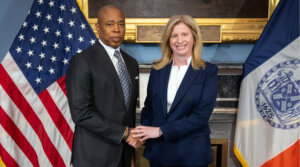
During Tisch’s tenure, the NYPD has handled more than 3,000 pro-Palestinian protests and rising antisemitism. According to the Anti-Defamation League, 68% of the 1,437 antisemitic incidents across the state of New York last year occurred in the five boroughs of New York City. NYPD data shows that antisemitic acts made up 57% of all reported hate crimes citywide this year, though Jews make up only 12% of the city’s population.
At the ADL’s annual summit earlier this year, Tisch noted that on the morning of Oct. 7, reported antisemitic crimes were down 20% compared with the previous year. But from that day to the end of 2023, they jumped 80%, and in 2024 they rose another 7%, accounting for 54% of all hate crimes reported in the city.
Mamdani attended some of the protests just after Oct. 7, and participated in a hunger strike outside the White House to call for a permanent ceasefire in November 2023. He has defended the campus protests and, along with other elected officials, criticized the Adams administration for its crackdown on them.
Tisch called out the antisemitism and defended the policing approach. In the ADL speech, she said that for some of the protesters, “their target was not and is not Israeli policy or geopolitics, or even the horrors of war, but the Jewish people themselves.”
She added, “The NYPD will follow the law, and we will uphold the First Amendment even when the protected language is deeply offensive to our own sensibilities. But make no mistake, anyone who commits a crime will be arrested, they will be held accountable, and our city will not go backward — not on my watch.”
In a recent speech at an award presentation and dedication of a new community center in Borough Park, Tisch said she draws inspiration from the mitzvah of building a fence around the roof when constructing a new home. “When you create something new, you also take on the duty to protect others — not just your family, not just yourself, but every person who enters your space,” Tisch said. She added, “The NYPD will always stand with you, making it clear that you are not alone in this city.”
For Jewish New Yorkers, whether or not Mamdani keeps Tisch as police commissioner, the real test will be whether he keeps his promise to protect all New Yorkers if he becomes mayor when the campaign is over.
The post Who is Jessica Tisch, the Jewish police commissioner both Mamdani and Cuomo want to keep? appeared first on The Forward.
Uncategorized
A border official mocked an attorney for observing Shabbat. Orthodox lawyers say the issue is not new.
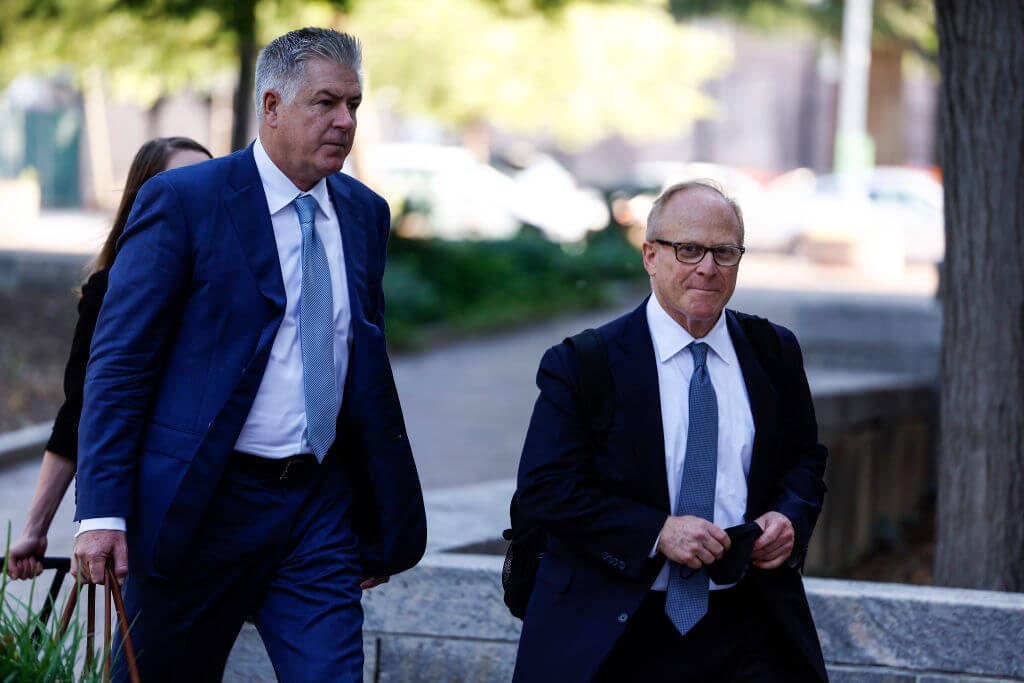
Gregory Bovino, the Border Patrol official who led immigration raids in Minneapolis, reportedly mocked the Jewish faith of Minnesota’s U.S. attorney during a phone call with other prosecutors in mid-January. According to The New York Times, Bovino complained that Daniel Rosen, an Orthodox Jew, was hard to reach over the weekend because he observes Shabbat and sarcastically pointed out that Orthodox Jewish criminals don’t take the weekends off.
The call took place at a moment of extreme tension in Minneapolis, as federal agents under Bovino’s command carried out an aggressive immigration crackdown that had already turned deadly. It came between the fatal shootings of Renée Good and Alex Pretti, both killed during enforcement operations, and amid fierce backlash from local officials and residents.
Bovino made the remarks in a derisive, mocking tone, the Times reported, casting Shabbat observance as a point of ridicule. Bovino had already drawn national attention for frequently wearing an olive double-breasted greatcoat with World War II-era styling, leading some critics to call him “Gestapo Greg” and accusing him of “Nazi cosplay.” Bovino, who pushed back on those comparisons, has since been reassigned.
Rosen, a Trump nominee, was confirmed as Minnesota’s U.S. attorney in October 2025 after a career in private practice and Jewish communal leadership. He has said that rising antisemitism helped motivate his decision to take the job, and that prosecuting hate crimes would be a priority for his office.
For many Orthodox Jewish lawyers, Bovino’s alleged remarks were not surprising. They echoed a familiar challenge: explaining that Shabbat — a full day offline — is not a lack of commitment, but a religious boundary that cannot be bent without being broken.
In a profession that prizes constant availability, that boundary can carry consequences. Some lawyers say it shows up in subtle ways: raised eyebrows, jokes about being unreachable, skepticism when they ask for time off. Others say it has shaped much bigger decisions, including how visibly Jewish they allow themselves to be at work.
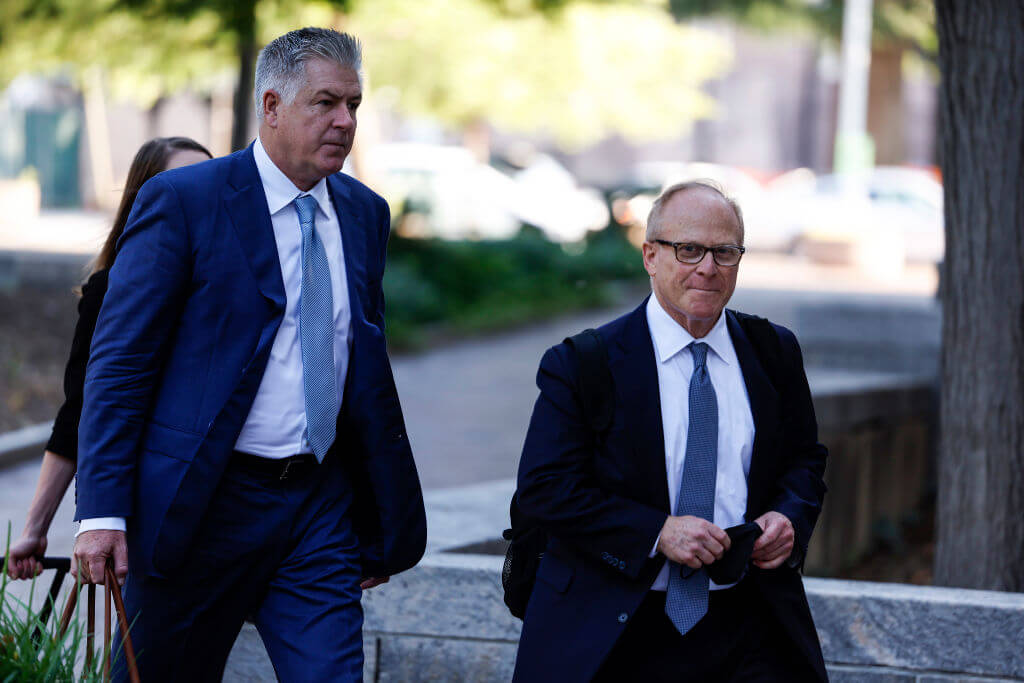
David Schoen, an Orthodox criminal defense attorney who served as lead counsel for President Donald Trump during his second impeachment trial, said he has long been mindful of how religious observance is perceived in the courtroom.
“I have made a conscious decision not to wear my yarmulke in front of a jury,” Schoen said, explaining that jurors often “draw stereotypes from what they see.”
Those concerns were reinforced by experience. Schoen said he has noticed a “definite difference in attitude” from some judges depending on whether he wore a yarmulke. In one case, he recalled, a Jewish judge pulled him aside during a jury trial and told him she thought he had made the right choice — a comment Schoen said he found disappointing.
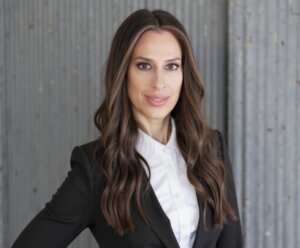
For Sara Shulevitz, a criminal defense attorney and former prosecutor, the Bovino episode brought back memories from early in her career.
Orthodox and the daughter of a Hasidic rabbi — now married to one — Shulevitz said her unavailability on Jewish holidays was often treated as a professional flaw rather than a religious obligation. “It held me back from getting promotions,” she said.
In court, the scrutiny could be blunt. “I was mocked by a Jewish judge for celebrating ‘antiquated’ Jewish holidays,” she said, recalling requests for continuances for Shemini Atzeret and Simchat Torah. In another case, she said, a judge questioned her request for time off for Shavuot and suggested she had already “taken off for Passover.”
When another judge assumed Passover always began on the same day in April, “I had to explain the Jewish lunar calendar in the middle of court while everyone was laughing,” she said.
Not every encounter, Shulevitz added, was rooted in hostility. Sometimes judges simply didn’t understand Orthodox practice. When she explained she couldn’t appear on a Jewish holiday, judges would suggest she join the hearing by Zoom — forcing her to explain that Orthodox Jews don’t use electrical devices on Shabbat or festivals.
The misunderstanding often slid into a familiar assumption. “They think you’re lazy,” she said. “It’s not laziness. Any Jewish woman knows how much work goes into preparing for Passover.”
Rabbi Michael Broyde, a law professor at Emory University who studies religious accommodation, said that Bovino’s alleged “derogatory remarks” are “sad and reflects, I worry, the antisemitic times we seem to be living in.”
He added that the criticism of Rosen reflected a basic misunderstanding of how law offices operate, calling it “extremely rare” for a lawyer’s religious practices to interfere with their obligations, especially when senior attorneys delegate work and courts routinely grant continuances.
“No one works 24/7,” Broyde said.
The episode echoed a similar Shabbat-related incident during Trump’s first term. In his 2022 memoir, former Trump trade adviser Peter Navarro described how a group sought to undermine Trump son-in-law Jared Kushner’s role in the 2020 campaign by scheduling a key White House meeting with Trump on a Saturday, knowing Kushner — who is Shabbat observant — would not attend. Navarro titled the chapter recounting the episode, “Shabbat Shalom and Sayonara.”
The tension between Jewish observance and public life is not new. Senator Joe Lieberman, the first observant Jew to run on a major-party presidential ticket, famously walked to the Capitol for a Saturday vote and ate fish instead of meat at receptions. His longtime Senate colleague Chris Dodd joked that he became Lieberman’s “Shabbos goy.”
Still, Schoen said, visibility can cut both ways. During Trump’s impeachment trial, while speaking on the Senate floor, he reached for a bottle of water and instinctively paused. With one hand holding the bottle, he used the other to cover his head — a makeshift yarmulke — before drinking.
The moment was brief, but it did not go unnoticed. In the days that followed, Schoen said he heard from young Jewish men and businesspeople who told him that seeing the gesture made them feel more comfortable wearing their own yarmulkes at work.
The attention, he said, was unexpected. But for some in the Orthodox community, it became a source of pride.
“I felt honored,” Schoen said.
My guess in all seriousness is that he normally wears a yarmulke and this was reflex. Schoen is modern Orthodox so that would make sense. But I defer to @jacobkornbluh https://t.co/MkKx6W03v2
— Jake Tapper 🦅 (@jaketapper) February 9, 2021
Jacob Kornbluh contributed additional reporting.
The post A border official mocked an attorney for observing Shabbat. Orthodox lawyers say the issue is not new. appeared first on The Forward.
Uncategorized
Deni Avdija becomes first Israeli to be selected as an NBA All-Star
(JTA) — Portland Trail Blazers star Deni Avdija’s meteoric rise has officially reached a new stratosphere, as the 25-year-old forward has become the NBA’s first-ever Israeli All-Star.
Avdija was named an All-Star reserve for the Western Conference on Sunday, an expected but deserved nod after the northern Israel native finished seventh in All-Star voting with over 2.2 million votes, ahead of NBA legends LeBron James and Kevin Durant. Avdija’s breakout performance this season has earned him repeated praise from James and others across the league.
Avdija’s star turn began last year in his first season with Portland, when he further captured the adoration of Jewish fans across Israel and the U.S. But he took another step forward this season, averaging 25.8 points, 6.8 assists and 7.2 rebounds per game. His points and assists clips are by far the best of his career, and rank 13th and 12th in the NBA, respectively. He’s considered a front-runner for the league’s Most Improved Player award.
For close observers of Israeli basketball, Avdija’s All-Star selection is the culmination of a promising career that began as a teenage star with Maccabi Tel Aviv and made him the first Israeli chosen in the top 10 in an NBA draft.
“Deni Avdija being named an NBA All-Star reserve is an unbelievable achievement in the mind of every Israeli basketball fan,” Moshe Halickman, who covers basketball for the popular Sports Rabbi website, wrote in an essay for the Jewish Telegraphic Agency. “This is a dream come true for many — a dream that became realistic and even a must-happen during his breakout season — but something that in his first five seasons in the NBA never came across as something that was going to be real.”
Halickman, who has covered Avdija in Washington, D.C., and in Israel, wrote that Avdija is not only considered the greatest Israeli hooper of all time, but perhaps the best athlete to come out of Israel, period.
Oded Shalom, who coached Avdija on Maccabi Tel Aviv’s Under-15 and Under-16 teams, echoed that sentiment in a recent profile of Avdija in The Athletic.
“Even though he is only 25, I think he is Israel’s most successful athlete in history,’’ Shalom said. “We’ve had some great gymnasts — and I hope everyone forgives me for saying it, because we’ve had some great athletes — but I think Deni has become the greatest.”
Avdija’s ascension has also come against the backdrop of the Gaza war and a reported global rise in antisemitism, which he has said affects him personally.
“I’m an athlete. I don’t really get into politics, because it’s not my job,” Avdija told The Athletic. “I obviously stand for my country, because that’s where I’m from. It’s frustrating to see all the hate. Like, I have a good game or get All-Star votes, and all the comments are people connecting me to politics. Like, why can’t I just be a good basketball player? Why does it matter if I’m from Israel, or wherever in the world, or what my race is? Just respect me as a basketball player.”
Now, Avdija’s talents will be on display at the NBA All-Star Game, on Sunday, Feb. 15, in Los Angeles.
The post Deni Avdija becomes first Israeli to be selected as an NBA All-Star appeared first on The Forward.
Uncategorized
Democratic leader says GOP-led Congress boosted ICE funding while Jewish security is underfunded
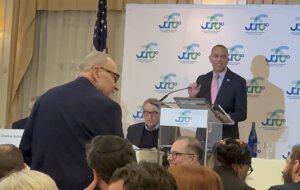
House Democratic Leader Hakeem Jeffries used a Jewish gathering in New York on Sunday to spotlight what he described as an imbalance in federal priorities, building on outrage over the Trump administration’s violent crackdown in Minneapolis that resulted in two fatal shootings.
Jeffries criticized the Republican-controlled Congress for boosting immigration enforcement funding by billions while, he said, security funding for Jewish institutions continues to lag amid rising antisemitic threats. He said that in the One Big Beautiful Bill Act, which passed last July and included cuts to Medicaid, the Department of Homeland Security received an additional $191 billion, including $75 billion for ICE.
“If that can happen, then the least that we can do is ensure that this vital security grant program is funded by hundreds of millions of dollars more to keep the Jewish community and every other community safe,” Jeffries said.
The Nonprofit Security Grant Program, established by Congress in 2005 and administered by FEMA under the Department of Homeland Security, provides funding to nonprofits, including houses of worship, to strengthen security against potential attacks. Congress began significantly increasing funding in 2018 after a wave of synagogue attacks nationwide, bringing the program to $270 million today.
Major Jewish organizations are pushing to raise funding to $500 million amid rising antisemitic threats. Last year, the Trump administration briefly froze the program as part of broader agency cuts, and some groups have been reluctant to apply because applicants must affirm cooperation with federal immigration enforcement.
Jeffries said House Democrats strongly support an increase to $500 million annually to meet escalating security needs. “It’s got to be an American issue, because that is what combating antisemitism should be all about,” he said.
The breakfast, previously held at the offices of the UJA-Federation of New York, was held this year for the first time in the events hall at Park East Synagogue, which was the site of a pro-Palestinian protest last year that featured antisemitic slogans and posters.
Sunday’s program also included remarks from Senate Minority Leader Chuck Schumer, who told the audience that his support for Jewish security funding will only continue growing under his leadership, calling it his “baby.”
“As long as I’m in the Senate, this program will continue to grow from strength to strength, and we won’t let anyone attack it or undo it,” Schumer said.
Rep. Jerry Nadler, the co-chair of the Congressional Jewish Caucus who is retiring at the end of the year after 36 years in the House, also spoke at the event. Nadler, like several other Democrats in recent months, compared the actions of ICE agents to the Gestapo, Nazi Germany’s secret police. The comparison has drawn sharp criticism from Democrats, Republicans and Jewish leaders.
Support for Israel aid
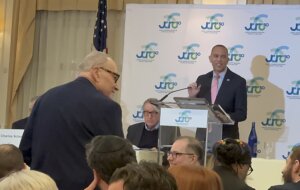
Both Schumer and Jeffries vowed in their remarks to continue supporting U.S. military assistance to Israel, amid increasing calls within the party for sharper opposition to Israel. Polls show that Democratic voters are increasingly sympathetic to Palestinians. In July, a record 27 Senate Democrats, a majority of the caucus, supported a pair of resolutions calling for the blocking of weapons transfers to Israel.
“I think it’s the humane thing to do to ensure that Israel has a right to exist as a Jewish and democratic state and eternal homeland for the Jewish people,” Jeffries said. The House Minority Leader, who has cultivated close ties with Jewish leaders since his election in 2012, noted that he has visited Israel nine times. He recalled that on his recent trip, Israel’s ambassador to the U.S., Yechiel Leiter, joked that it might be time for Democrats to buy property in Jerusalem.
Schumer, the nation’s highest-ranking Jewish elected official, has seen his popularity decline and has faced calls to step down from his role as leader. On Sunday, he pledged that he “will always fight to give Israel what it needs to protect itself from the many who want to wipe Israel off the face of the map.”
The post Democratic leader says GOP-led Congress boosted ICE funding while Jewish security is underfunded appeared first on The Forward.


